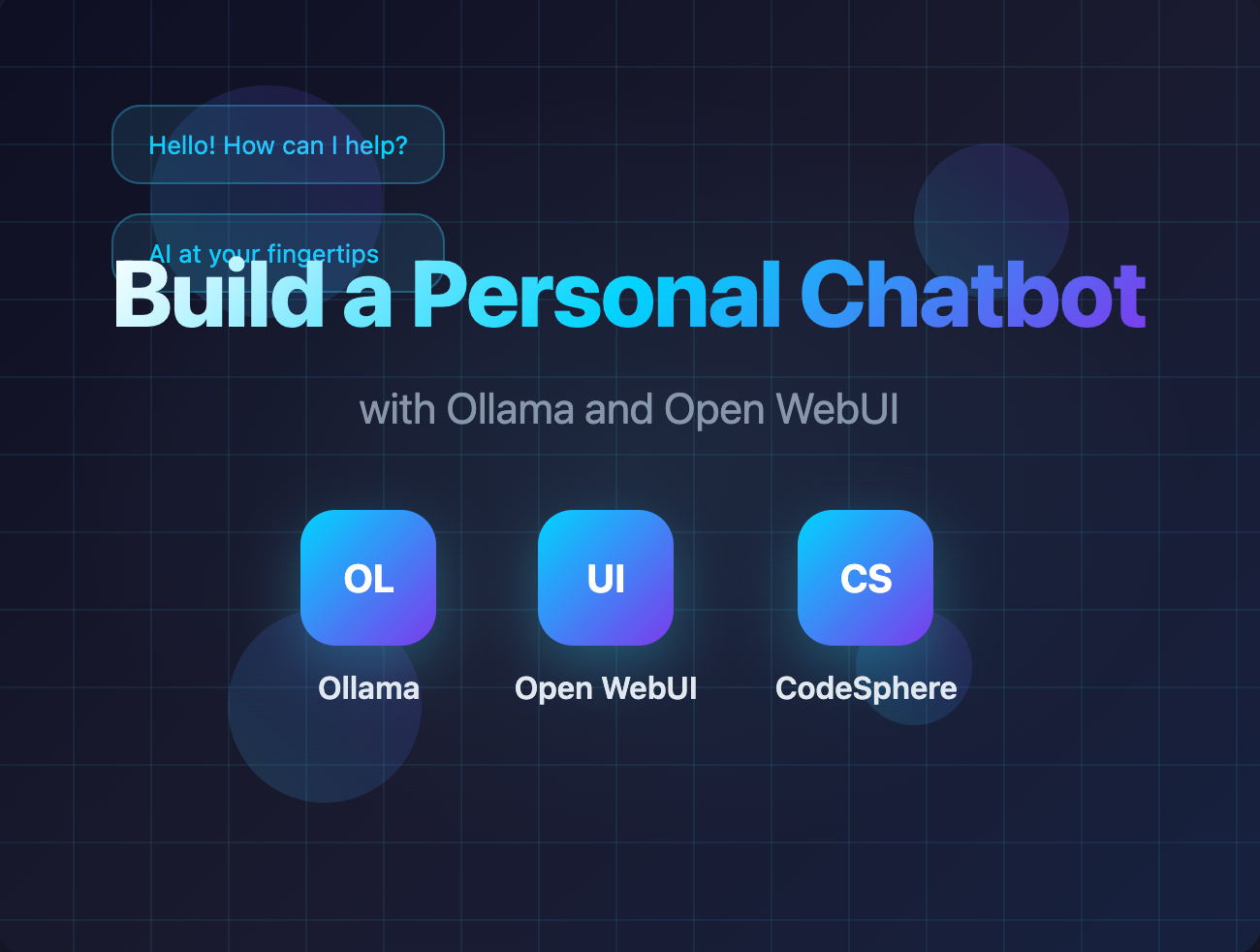Build a Personal Chatbot with Ollama and Open WebUI
Discover how to run Ollama with Open WebUI using a streamlined Codesphere deployment. This blog walks through the benefits, use cases, and a complete step-by-step setup to launch a private, local LLM environment

The AI revolution is happening quickly but most tools have a catch: powerful features come either with walled-off APIs, or with open models with complex setups to get them working.
Wouldn't it be great to have the best of both worlds? The capability of open-source large language models (LLMs) like LLaMA 3, the flexibility of hosting it all locally, and the convenience of a refined interface without needing to write a Dockerfile or mess around with ports?
That's what this blog post will guide you through.
This guide presents an end-to-end local LLM solution by combining Ollama, a performance-intensive model runner for open-source LLMs, with Open WebUI, a new, browser-based interface intended for easy LLM interaction. The entire setup is available as a public repository ready-to-use on Codesphere. This blog post introduces the stack and shows how to get started using the public repo.
The outcome is a production-ready, customizable, and private AI assistant stack working in minutes and completely at the control of the user.
What is Ollama?
Ollama is a light, high-performance framework that makes it easy to execute LLMs locally or in private settings. It streamlines the deployment process by packaging models into containers with all runtime dependencies and configurations.
Key Features of Ollama:
- Runs locally
- Supports popular open models.
- Container-based model packaging.
- Performance optimization.
Rather than dealing with intricate CUDA configurations, transformer libraries, or infinite dependency graphs, Ollama allows you to just pull and execute a model using simple commands like:
ollama pull llama3
ollama run llama3
What Is Open WebUI?
Open WebUI is the user interface layer that enables interacting with LLMs to be fun and intuitive.
Rather than conversing with a model via the command line or Postman, Open WebUI provides you with a full-featured chat experience that is on par with commercial AI platforms. It includes:
- Chat history and multi-conversation capabilities
- Prompt templates and system commands
- Markdown and image support
- Token usage statistics
- Role-based interactions and personas
It executes completely in your browser and communicates directly with the Ollama backend.
For developers, it's a snap to extend. For teams, it's deployable. For users, it just works.
Why Bring Ollama and Open WebUI Together?
Running locally large language models is fantastic for privacy, speed, and controlling cost — but the command line is not the place where everyone wants to dwell. That is where Open WebUI comes into play.
Ollama provides intellect. Open WebUI provides an interface. Both are brought together and offer an integrated local LLM experience that's finished, solid, and personalized. Ollama fixes infrastructure and performance. Inference is quick and memory-friendly. You have access to open models such as LLaMA 3, Mistral, Gemma, and DeepSeek. It can handle multiple models with a few commands.
But Ollama, by default, is a backend. You use it through terminal or REST calls not so great for exploration, user feedback, or non-technical users.
Open WebUI fixes usability and experience:
- It has a clean, responsive chat interface for conversing with LLMs.
- It handles multiple conversations, markdown, and prompt templates.
- It functions out-of-the-box with Ollama's API; no integration work required.
Together, they form a self-contained AI ecosystem that needs no cloud, no subscriptions, and no trade-offs:
Need a ChatGPT-like tool for your team with no data leaving your servers? ✅
Need to test several open-source models head to head with total control?✅
Using LLMs in edge settings where internet access is restricted?✅
Want a pretty local UI over top of bleeding-edge models?✅
This stack is not only open source it's open-ended. You can theme it, automate it, extend it, or containerize it for deployment.
Deployment Guide: Use the Codesphere Public Repo
Deployment Guide: Use the Codesphere Public Repo The entire Ollama + Open WebUI setup is available as a ready-to-use public repo on Codesphere, enabling quick deployment of a local LLM environment in the cloud.
This repo runs everything in a single workspace, automatic startup scripts, and persistent storage, making it ideal for both experimentation and production use. Whether you're testing new models, building a private AI assistant, or running secure experiments without local hardware constraints the repo offers a powerful and frictionless starting point.
🔗 Learn how to deploy the repo step by step: Read the Deployment Guide here
✅ Pros vs ❕ Considerations for Ollama + Open WebUI
When evaluating Ollama combined with Open WebUI as a local LLM stack, it's important to understand the strengths and trade-offs of this setup. The table below shows a quick comparison:
Ollama + Open WebUI vs Other LLM Deployment Methods
When choosing the right method for deploying and using LLMs, it’s essential to consider the trade-offs between convenience, cost, and control. The table below highlights key features and compares Ollama + Open WebUI with other common deployment methods, like Hugging Face Spaces, LM Studio, and ChatGPT Pro.
This comparison will help assess the strengths and limitations of each approach for those looking to host and interact with LLMs effectively.
Use Cases for Local LLMs with Open WebUI
Ollama + Open WebUI supports a variety of privacy-centered, local-first workflows:
- Business Assistants: Respond to questions, automate processes, secure data.
- Research: Summarize, derive insights, research topics offline.
- Education: Tutor students remotely, explain concepts, tailor learning.
- Content Writing: Write, edit, and polish drafts locally.
- Legal Work: Review, summarize, and organize documents securely.
Conclusion
Running large language models is no longer necessarily complicated or cloud-based. With Ollama and Open WebUI, one can utilize high-performance, open-source LLMs locally accompanied by a streamlined, user-friendly interface for working with them. This arrangement brings speed, privacy, and control, making it ideal for use in a diverse group of use cases, ranging from business processes and education to content generation and research.
Working in combination, they serve as an easy but influential starting point to constructing personal, agile AI utilities all while keeping data in your own control and independent of third-party networks.
